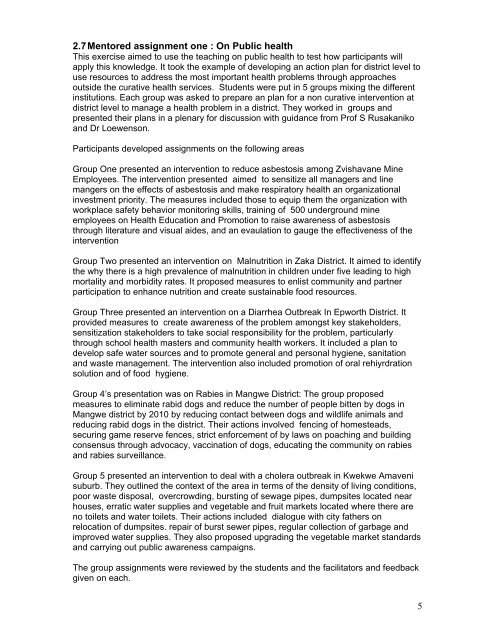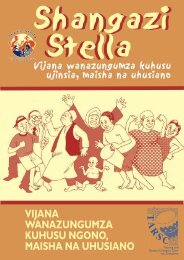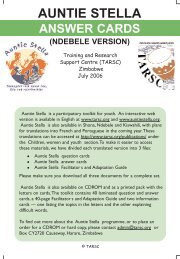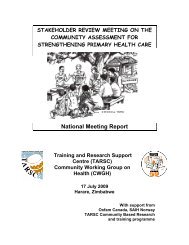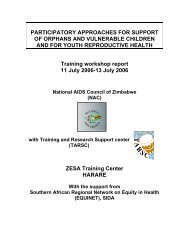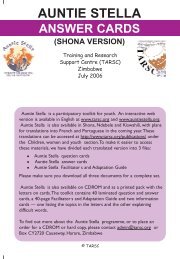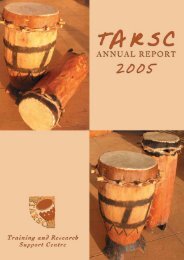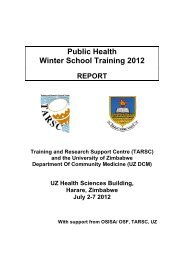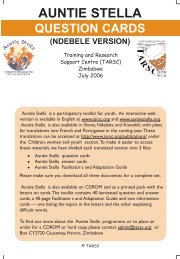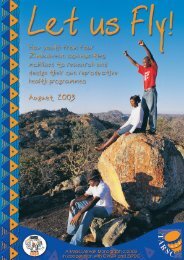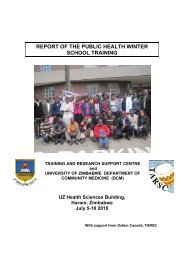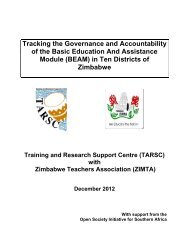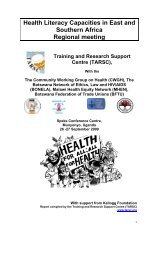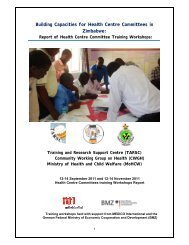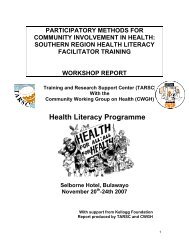WS07 REPORT.pdf - Training and Research Support Centre
WS07 REPORT.pdf - Training and Research Support Centre
WS07 REPORT.pdf - Training and Research Support Centre
You also want an ePaper? Increase the reach of your titles
YUMPU automatically turns print PDFs into web optimized ePapers that Google loves.
2.7 Mentored assignment one : On Public health<br />
This exercise aimed to use the teaching on public health to test how participants will<br />
apply this knowledge. It took the example of developing an action plan for district level to<br />
use resources to address the most important health problems through approaches<br />
outside the curative health services. Students were put in 5 groups mixing the different<br />
institutions. Each group was asked to prepare an plan for a non curative intervention at<br />
district level to manage a health problem in a district. They worked in groups <strong>and</strong><br />
presented their plans in a plenary for discussion with guidance from Prof S Rusakaniko<br />
<strong>and</strong> Dr Loewenson.<br />
Participants developed assignments on the following areas<br />
Group One presented an intervention to reduce asbestosis among Zvishavane Mine<br />
Employees. The intervention presented aimed to sensitize all managers <strong>and</strong> line<br />
mangers on the effects of asbestosis <strong>and</strong> make respiratory health an organizational<br />
investment priority. The measures included those to equip them the organization with<br />
workplace safety behavior monitoring skills, training of 500 underground mine<br />
employees on Health Education <strong>and</strong> Promotion to raise awareness of asbestosis<br />
through literature <strong>and</strong> visual aides, <strong>and</strong> an evaulation to gauge the effectiveness of the<br />
intervention<br />
Group Two presented an intervention on Malnutrition in Zaka District. It aimed to identify<br />
the why there is a high prevalence of malnutrition in children under five leading to high<br />
mortality <strong>and</strong> morbidity rates. It proposed measures to enlist community <strong>and</strong> partner<br />
participation to enhance nutrition <strong>and</strong> create sustainable food resources.<br />
Group Three presented an intervention on a Diarrhea Outbreak In Epworth District. It<br />
provided measures to create awareness of the problem amongst key stakeholders,<br />
sensitization stakeholders to take social responsibility for the problem, particularly<br />
through school health masters <strong>and</strong> community health workers. It included a plan to<br />
develop safe water sources <strong>and</strong> to promote general <strong>and</strong> personal hygiene, sanitation<br />
<strong>and</strong> waste management. The intervention also included promotion of oral rehiyrdration<br />
solution <strong>and</strong> of food hygiene.<br />
Group 4’s presentation was on Rabies in Mangwe District: The group proposed<br />
measures to eliminate rabid dogs <strong>and</strong> reduce the number of people bitten by dogs in<br />
Mangwe district by 2010 by reducing contact between dogs <strong>and</strong> wildlife animals <strong>and</strong><br />
reducing rabid dogs in the district. Their actions involved fencing of homesteads,<br />
securing game reserve fences, strict enforcement of by laws on poaching <strong>and</strong> building<br />
consensus through advocacy, vaccination of dogs, educating the community on rabies<br />
<strong>and</strong> rabies surveillance.<br />
Group 5 presented an intervention to deal with a cholera outbreak in Kwekwe Amaveni<br />
suburb. They outlined the context of the area in terms of the density of living conditions,<br />
poor waste disposal, overcrowding, bursting of sewage pipes, dumpsites located near<br />
houses, erratic water supplies <strong>and</strong> vegetable <strong>and</strong> fruit markets located where there are<br />
no toilets <strong>and</strong> water toilets. Their actions included dialogue with city fathers on<br />
relocation of dumpsites. repair of burst sewer pipes, regular collection of garbage <strong>and</strong><br />
improved water supplies. They also proposed upgrading the vegetable market st<strong>and</strong>ards<br />
<strong>and</strong> carrying out public awareness campaigns.<br />
The group assignments were reviewed by the students <strong>and</strong> the facilitators <strong>and</strong> feedback<br />
given on each.<br />
5


